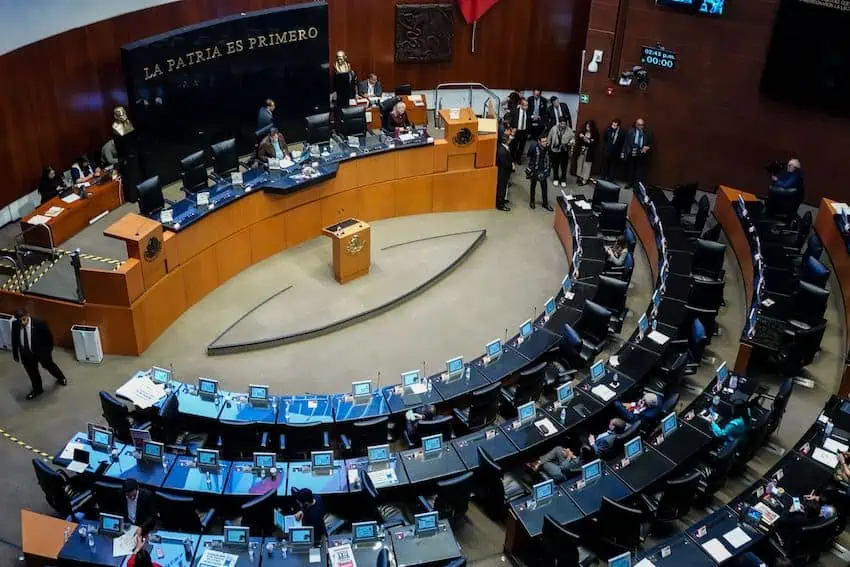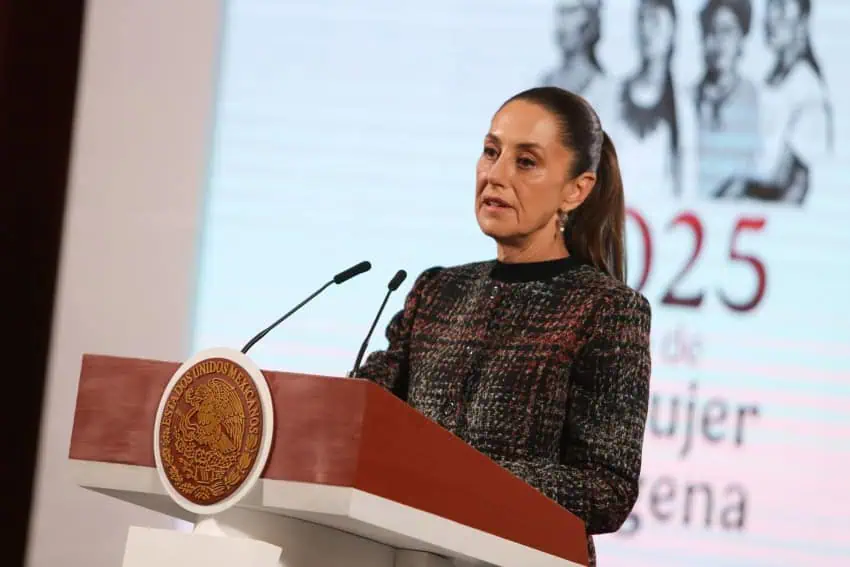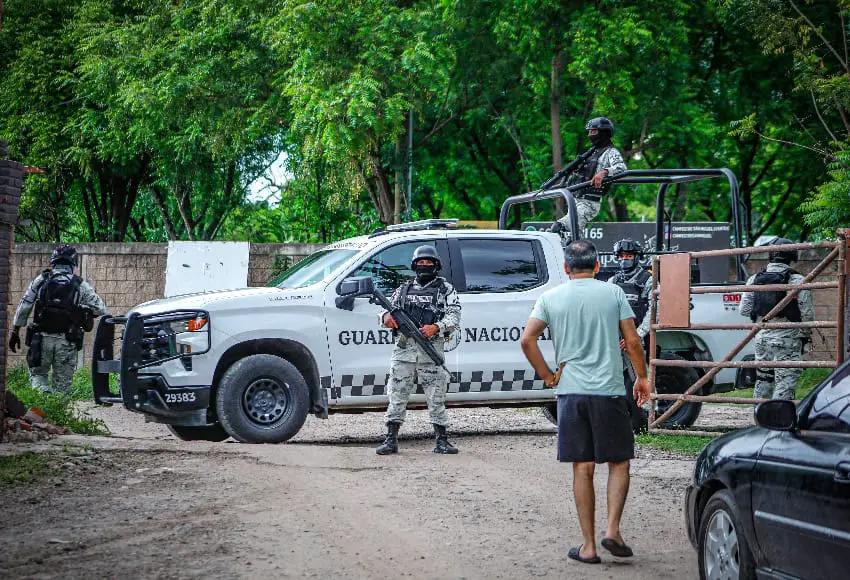Should Mexico allow the United States military to come into the country to combat violent drug cartels?
National Action Party (PAN) Senator Lily Téllez, for one, is in favor of the idea.

On Tuesday, Téllez expressed her view during remarks she made in the Senate, which approved President Claudia Sheinbaum’s request for 10 U.S. soldiers to come into Mexico to provide training to Mexican marines.
“This is nothing new,” the senator said, referring to the entry of U.S. military personnel to Mexico to conduct training exercises with Mexican forces.
“… It’s a practice that has occurred and which always reminds us that there can be cooperation between both military forces, those of the United States and those of Mexico,” Téllez said.
Sheinbaum has stressed that Mexico is willing to collaborate with the United States on security issues, but asserts that it will do so as an equal partner and not accept subordination. She is staunchly opposed to the use of the United States military on Mexican soil to combat Mexican cartels, an idea to which U.S. President Donald Trump, and people close to him, have expressed openness.

Téllez, in remarks clearly directed at Sheinbaum, said that the entry of United States forces to Mexico to “cooperate” with Mexicans on training exercises doesn’t amount to an “invasion” or a violation of Mexico’s sovereignty.
“The homeland wasn’t sold, the homeland wasn’t subjugated because constantly there is this cooperation between United States forces and Mexican forces,” she said.
“Why then not accept the cooperation of the United States to act against the cartels in Mexico?” Téllez asked.
“Why not accept it under an agreement of cooperation within a legal framework as is happening, and as has happened during all these years when these kinds of [training] exercises that we authorized today are carried out?”
The senator asserted that Mexico is incapable of combating powerful criminal organizations, such as the Jalisco New Generation Cartel and the Sinaloa Cartel, on its own.
“The reality is that the Mexican state can’t combat the cartels because if the Mexican state were able to combat the cartels, it would have already done it, right?” Téllez said.
Her remarks came six days after the U.S. government announced it intended “to pursue total elimination of Cartels and Transnational Criminal Organizations.”
On Jan. 20, the first day of his second term, Trump signed an executive order to designate drug cartels as foreign terrorist organizations, a move that pleased Téllez.
Aunque sea en EU, celebro que mi iniciativa para designar cárteles como terroristas, es realidad.
Ese era mi mayor anhelo desde 1999, cuando hacía reportajes sobre cárteles y sobreviví a un atentado.
Este es un primer paso hacia la verdad: en México hay un narco Estado.
— Lilly Téllez (@LillyTellez) January 22, 2025
Asked at the time whether he would consider “ordering U.S. special forces into Mexico” to “take out” cartels, Trump said it “could happen.”
“Stranger things have happened,” said the president, who last year indicated he was open to using military “strikes” against Mexican cartels.
A poll conducted by the Reforma newspaper late last year revealed that 46% of respondents had a favorable view of Mexico collaborating with the U.S. to fight drug cartels in Mexico. Exactly half of those polled were opposed to the idea.
Téllez: ‘The cartels are partners of Morena’
In the second half of her Senate floor speech, Téllez said that cooperation with the United States to combat cartels in Mexico “could save the lives of Mexicans” that the ruling Morena party “has left defenseless in the face of organized crime’s war against citizens.”
“… If it is clear that there can be cooperation without subjugation, why doesn’t Morena want it?” asked the senator, who defected from Morena to PAN — Mexico’s largest opposition party — in 2020.
“It doesn’t want it because the President Claudia, the secretary of AMLO, is protecting his narco-state. The cartels are partners of Morena, to them they owe their arrival and continued presence in power,” Téllez claimed.

With those words, she echoed the view expressed by the White House in a Feb. 1 fact sheet on the tariffs Trump planned to impose on Mexican exports to the United States last week, but agreed to pause for one month after Sheinbaum committed to deploying 10,000 National Guard troops to the northern border.
“The Mexican drug trafficking organizations have an intolerable alliance with the government of Mexico,” said the White House, which also asserted that the Mexican government has “afforded safe havens for the cartels to engage in the manufacturing and transportation of dangerous narcotics.”
Sheinbaum unsurprisingly rejected the White House’s claims, describing them as “libel.”
In the same social media post, the president also said that the Mexican government is opposed to “any attempt at interference in our territory” — i.e. U.S. military action against Mexican cartels on Mexican soil.
Téllez accused Sheinbaum of making up “excuses” and “pretexts” to oppose cooperation with the United States to combat cartels in Mexico, and asserted that Morena puts the interests of “its criminal partners” ahead of those of ordinary Mexicans.
“In fact, there is a global scandal because the government of Sheinbaum colludes with organized crime,” she said.
“And there is some background to this. The dictator of Colombia, the guerrilla Gustavo Petro, [the current Colombian president] said that Sheinbaum was a member of the M-19 guerrilla group. … That’s why Sheinbaum now doesn’t want to act against cartels,” she said.
“… This narco-government represents the greatest threat to citizens in the history of Mexico,” Téllez asserted.
For its part, the Sheinbaum administration frequently emphasizes its commitment to combating cartels and their criminal activities.
Security Minister Omar García Harfuch told reporters on Tuesday that 11,600 people have been arrested for “high-impact crimes” since the new government took office on Oct. 1, while over 100 tonnes of drugs and more than 5,000 firearms have been seized.
Sheinbaum herself noted on Tuesday that last month was the least violent January in eight years in terms of homicides. She also highlighted that murders declined 12% in January compared to the month before she took office.
“We’re going to keep working every day to build peace and security in our country,” Sheinbaum said.
Mexico News Daily
